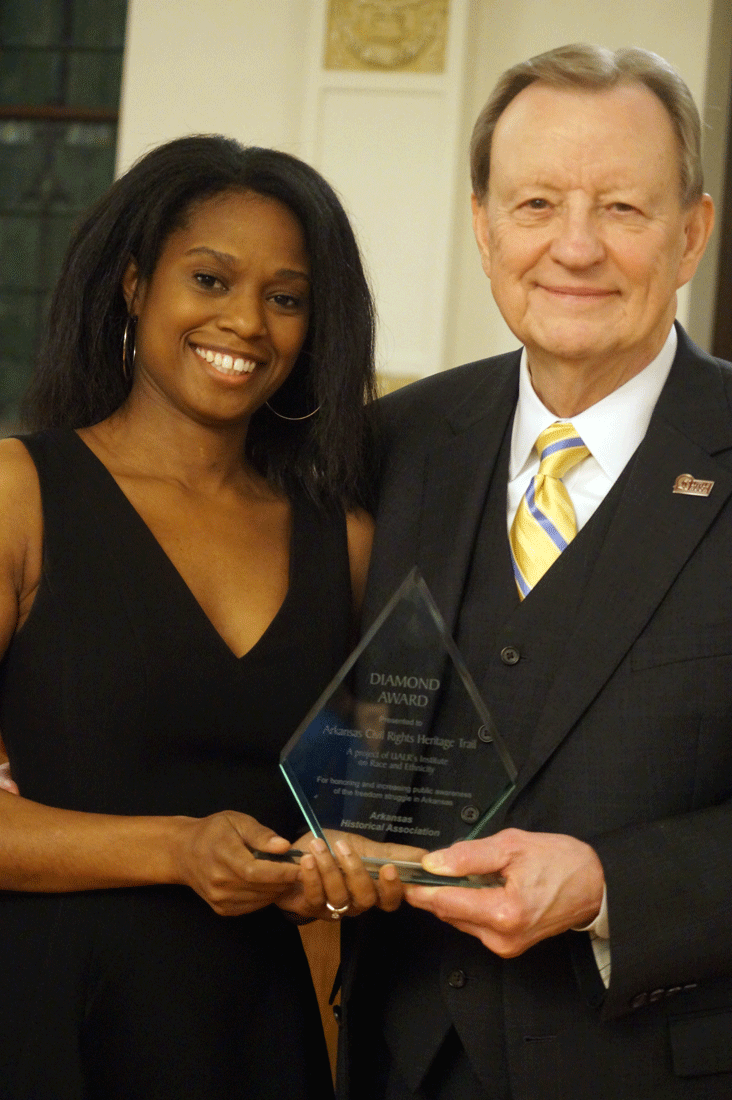Arkansas Historical Association honors UALR Institute on Race and Ethnicity, Carl Moneyhon

Institute on Race and Ethnicity receives award of merit
In addition to the Diamond Award, the institute received an award of merit, an annual award that recognizes public history programs of excellence, for the Arkansas Civil Rights History Tour App that launched in November 2015. The app, created in partnership with Little Rock city officials, offers residents and visitors a new way to explore the city’s rich civil rights history. The free Apple and Android app guides users on an excursion through some of the city’s most influential historical sites, going back to the 1840s. Each of the 35 stops on the GPS-guided tour includes compelling narratives, historic photos, audio, and links to related content. Narrated in both English and Spanish, the app also offers information about Jewish history in Little Rock, Hispanic migrations to Arkansas, and Native American tribes.John Kirk receives Violet B. Gingles Award
In the individual award categories, Kirk received the Violet B. Gingles Award for his manuscript, “The Politics of Southern Industrialization: Winthrop Rockefeller, Orval Faubus and the Arkansas Industrial Development Commission.” The award is presented to the person who writes the best manuscript article on any Arkansas history topic. Kirk will receive $500, and his manuscript will be published in Arkansas Historical Quarterly. Kirk’s manuscript covers the political events leading to Winthrop Rockefeller being elected the first Republican governor of Arkansas since Reconstruction. Rockefeller served as chairman of the Arkansas Industrial Development Commission, a position Gov. Orval Faubus appointed him to in 1955. However, Rockefeller opposed Faubus’ stance on segregation. “Rockefeller saw segregation as being bad for business, and Faubus put segregation in the national spotlight by preventing nine black students from entering Central High School in 1957,” Kirk said. “It eventually led to Rockefeller running for office and beating the leading segregation candidate. It was a pivotal election for the state because Rockefeller became the first Republican governor in the state in over 90 years.”Carl Moneyhon receives Lifetime Achievement Award
In addition to the institute’s awards, Moneyhon received the Arkansas Historical Association Lifetime Achievement Award for his research, teaching, and outreach to the public. “I have felt since I came to Arkansas that there was much to be done in terms of recording the state’s history, and I have tried to do my best in filling that gap,” Moneyhon said. “I appreciate the association’s recognition of that work.” Moneyhon joined UALR in 1973. He is a specialist in the history of the American Civil War and the South and has been widely published in the field. He also is a faculty liaison with the University History Institute, an organization that develops closer ties between the department and the community, and a fellow of the Texas Historical Association. Moneyhon has served on the editorial boards of the Arkansas Historical Association’s journal, Arkansas Historical Quarterly, and the Encyclopedia of Arkansas History and Culture. In the upper right photo, Tamisha Cheatham, program coordinator at the UALR Institute on Race and Ethnicity, and Chancellor Joel E. Anderson receive the Diamond Award for Arkansas Civil Rights Heritage Trail at the Arkansas Historical Association’s award ceremony on April 22.

